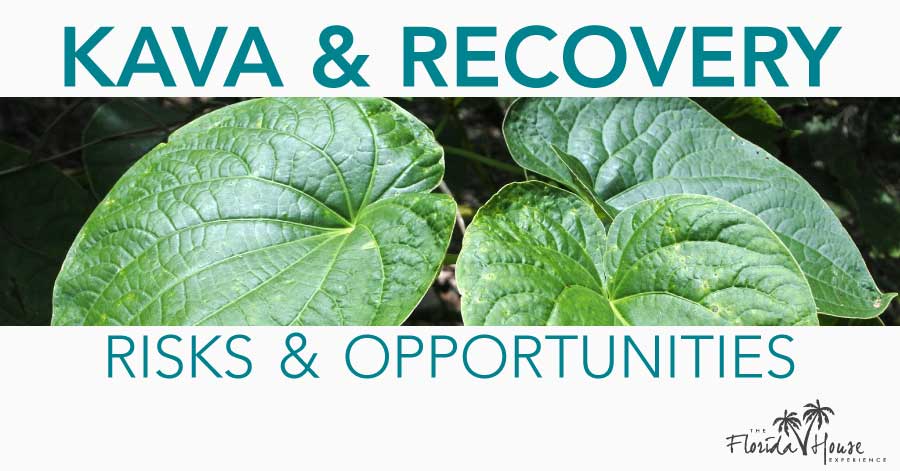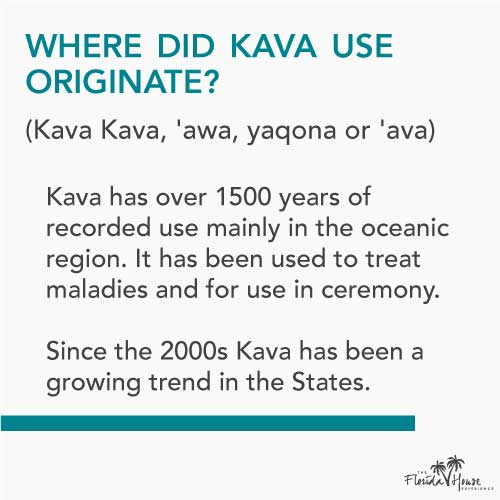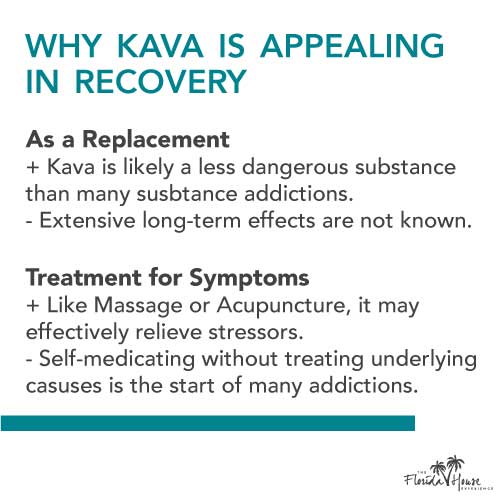
Kava, a plant with extracts known to be used for stress relief, relaxation and a wide range of other remedies in thePacific Islands of Polynesia, is one of the latest natural remedies to make a surge into modern culture.
Lately, there’s been a trend of people taking Kava as a replacement for sedatives like benzodiazepines (Xanax, Valium,etc.) and even opioids. On the surface, this would seem like a positive development. Kava is a plant that doesn’t get users “high” like the drugs listed do, and the risk for overdose is extremely low. It may seem like a good thing that people are using Kava in recovery, either to wean themselves off of addictive substances or to replace them, but it’s important to understand the possible risks.
What Is Kava?

The Kava plant is used in many forms, ranging from traditional practices of making a tea-like beverage out of the root extract to using a powdered version of the plant in capsules or to add into other substances.
How Does Kava Work?
Kava has been known to relieve pain and anxiety, with a variety of studies that confirm the claim. Understanding the effect Kava has on the human brain takes a bit of knowledge about how drugs create feelings of pleasure. Opioids, for example, bind to opioid receptors in the brain and release dopamine, causing the brain to progressively demand more and more of the same type of substance, which leads to addiction.
Barbiturates and benzos, on the other hand, agonize GABA receptors, which have a similar effect. Studies concerning the effect of Kava suggest that the chemicals in the plant have a similar effect on the brain as these latter drugs, but unlike Xanax and Valium which produce a high, Kava is known only to produce a pleasant, calm feeling of relaxation without clouding the user’s focus.
How Is Kava Used in Recovery?

1. As a Replacement for Addictive Substances
This is probably the most common method of using Kava to support recovery and can be particularly useful for people who are addicted to substances that affected the brain’s GABA receptors. It’s not widely believed that Kava would be able to replace opioids, for example, because of the differences in how opioids affect the brain.
The logic is similar to that of buprenorphine, a medication used to help recovery from heroin and other opiates. The substance competes with other opiates, binding to the receptors and satiating their needs while spurring the release of dopamine. Technically, however, buprenorphine is an opioid carrying the same (albeit lower) risk of addiction, while Kava is, in theory, not a harmful substance.
2. To Help Relieve the Stress and Anxiety That May Tempt Them to Use
There’s a wide base of research that supports the use of Kava as a treatment for stress and anxiety disorders, and we know that stress is heavily correlated with the chances to relapse, due to a study on the matter carried out by the National Institute on Drug Abuse (NIDA). It’s rational to believe, then, that a substance that relieves stress and anxiety can help addicts resist temptation and triggers for relapse.
What Are the Dangers of Kava Use?
Kava is part of a group of herbal remedies that the FDA won’t make a concrete ruling on because of potential risks. The World Health Organization has stated that Kava is relatively safe, but some sources have tied Kava use to liver toxicity, which can be dangerous, especially in people with liver problems due to drinking or drug use. However, the addictive potential of the plant seems to be low.
Is it Okay to Use Kava in Recovery?
Similar to other herbal “drugs” like Kratom, a Southeast Asian herb used to imitate opioids, there is a robust debate about the safety and potential for use of Kava to support recovery from addiction. The known risks are relatively low, and some addicts may get a tangible benefit from using the plant as a replacement for more dangerous substances. However, people have differing viewpoints about herbal remedies. Where do we draw the line? There’s no one saying that we shouldn’t be using some “safer” herbs —chamomile or peppermint, for example — for their benefits.
It’s important to remember that most substances, from synthetic medications to natural substances, that change the way your brain functions necessarily involve chemicals. Once you start to rely on a substance to function, it can become a crutch or a vice, and one of the main ideas at the heart of addiction treatment is to help patients recover without relying on another substance — even if it’s a “natural” one.
What you “should” or “shouldn’t” do in life is more complicated than something you can read in an article, and you should make a decision that’s right for you. But the potential health risks of Kava mixed with the fact that it, like any other substance, can be misused, means that at FHE Health, we don’t recommend it. Contact us for more information about addiction and effective, sustainable treatment methods.






